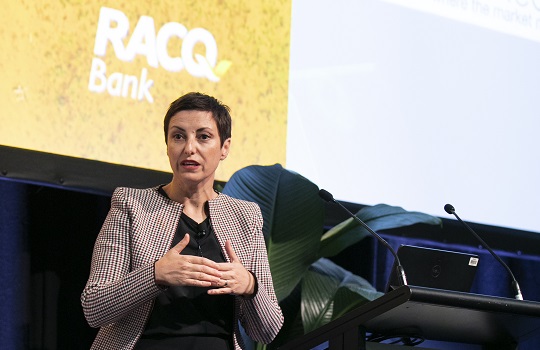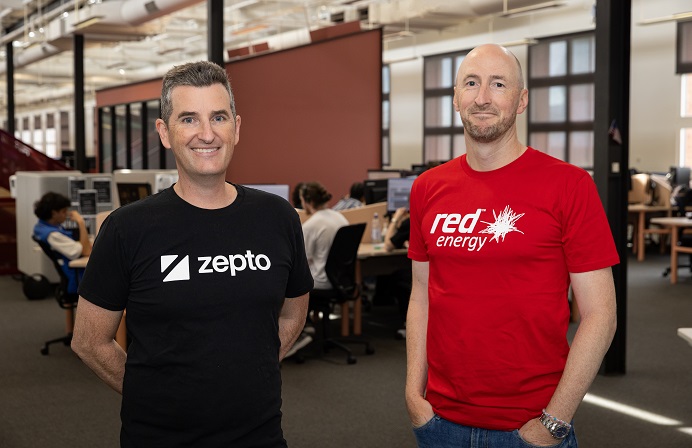
Despite the successful deployment of its CDR-ready core banking system, RACQ Bank chief Michelle Bagnall has little interest in the forthcoming Open Banking regime, seeing it as little more than a “compliance activity” for the Queensland challenger.
Acknowledging her somewhat “controversial” take on Australia’s inaugural national data-sharing regime, Bagnall stressed that while it is not what she might consider an “interesting” proposition for the bank – “not to us not to our brand not to what we offer our members” – she did nevertheless stresses its critical importance to customers, with many expecting banks, and particularly member-focused mutuals, to assist with “education and advocacy” around the workings of new regime.
Speaking at FST’s Future of Financial Services conference in Sydney last week, Bagnall said, despite the challenger’s lack of enthusiasm for the scheme, Open Banking presents a prime opportunity to build “banking competencies” around the entire RACQ Group, with a further prospect of expanding the business into other trust- and price-sensitive industries that may be ripe for disruption, including energy and utilities.
“My ideal state in the future is that we’re able to drop the word ‘bank’ [from] our name and just talk about coming to RACQ,” Bagnall said.
Open Banking will also present a rare chance for banks to rebuild consumers’ waning trust in the industry, giving those supportive, customer-focused institutions – those that can suspend self-interest and utilise this data in the direct interests of customers – a considerable reputational boost. Yet, any sense that banks have misused or misappropriated data could also drastically reduce confidence in the industry.
“Our members will need to know very clearly ‘what’s in it for me and why should I give you access to my data’,” Bagnall said. “But equally, again, even if they choose not to, it’s how we engender that trust and use that information for good, not evil, in helping them get a better deal wherever they choose to do business.”
“Customers will expect us to look after them. They will expect us to help them with education and advocacy.”
“Maintaining humanity through digital”
Despite the obvious temptation to build out a “sexy” digital frontend to lure customers, Bagnall said the bank had stuck firm to its goal of rebuilding its core technology stack before attempting to bolt on any service overlays – a process she referred to as “pouring concrete”.
Following a two-year rollout of its Fiserv core banking system, coupled with RACQ’s whole-of-business CRM rollout, Bagnall said the bank’s steady focus on ‘cementing’ its core has given it the ideal foundations to execute its next three-year digital expansion program.
“We’ve just replaced [our core systems] – they’re ready for Open Banking, they’re ready for CCR (consumer credit reporting); the layers are all there… ready to partner with whoever wants to plug in,” she said.
“You’ll see that a lot of what we’re focusing on in these three years is driven by member experience. And that member experience is digital led – everything that we’re investing in is digital led.”
This back-to-basics approach has seen the bank consolidate its once sprawling digital works program – reducing, in just 18 months, an unwieldy task sheet of 60 separate digital projects to just five core initiatives today.
This process has been anchored by a parallel cultural change initiative across the business, requiring leaders to enforce behavioural “change processes before [executing] the tech”.
Emphasising culture before technology, RACQ’s wholesale transformation program has already borne fruit for the company, with home loan approval times slashed from 38 days to just 11 within 18 months, achieved through tweaks to staff behaviours and manual processes alone. With the next round of technology deployments expected to be online within two months, Bagnall said the bank will be able to further slash home loan approval times to within a single day.
“Now that we’ve done the foundations and the basics, we’re now building a much faster time to ‘yes’.
“Most of that change has happened through behaviours and process, and rethinking that from a member experience point of view,” she said. “Executing the tech will get us to the next place, which is great. But a lot can be done with a lot less money being spent.”
Crucially, in period of wholesale change and transformation across the business, RACQ Bank has still managed to achieve 19 per cent direct growth in its membership base, Bagnall said.
Yet, in reaching for efficient, cost-saving technology solutions, long-established human connections between staff and customers are too often sacrificed. For Bagnall, success in RACQ’s digital transformation program is predicated on its ability to effectively “walk that line between driving to scale and efficiencies” and the maintaining its long-established “humanity” as a member-focused brand.
“How we build that experience into digital is the next frontier that we’re facing as a business. But we’re going to look at that through that lens of humanity – of how we maintain that humanity through digital.”
A ‘humanity-by-design’ approach must ultimately be built on a foundation of trust, Bagnall states.
This trust-backed digital program is strictly enforced by RACQ’s Head of Product, who is guided by three core objectives (providing a useful benchmark for RACQ’s wider leadership team): product price regulatory excellence – a “keep us safe, and don’t get us into trouble” objective, according to Bagnall; improved customer acquisition – creating “digital”, “fast” and “seamless” experiences “that [make] it easy for our members to switch to us if they want to”. And finally, empowering customers and members who “don’t want to switch to us” and supporting their general banking queries – being as, Bagnall candidly states, a “pain in the arse to their other bank”.
“All three of those KPIs matter to him equally because our job at RACQ is not just to earn money from banking services – it’s to be an advocate in the space of banking for our members.”





